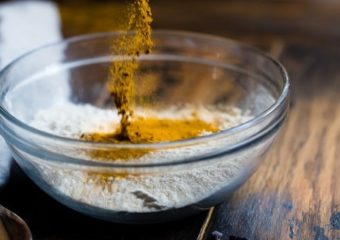There is a lot of buzz around this plant lately and that’s for a good reason. This popular Indian spice, that gives curry its colour, is a wonder of nature. It has plenty of amazing health benefits. Turmeric works well when digested through the consumption of food, teas or supplements. But, did you know that it also does wonders for the skin when applied externally? Multiple studies have shown that curcumin (the main active substance in turmeric) has anti-inflammatory, antioxidant benefits. In today’s article we’ll find out how to take turmeric for inflammation and much more.
What Is Turmeric / Curcumin?
Turmeric is the main spice in the Indian dish, curry, and it’s a powder that derives from the roots of the Curcuma Longa plant. It has a bitter taste and it is commonly used to colour curries, mustards, butters and cheeses. Curcumin is the main component in turmeric and it’s the part that gives the bright orange colour, as well as, most of the health benefits.
Unfortunately, turmeric only contains 3% curcumin which is not enough to reap all of the antioxidant and anti-inflammatory benefits. So that’s when turmeric supplements come in handy as they provide higher dosages of curcumin in the form of capsules, elixirs, gels, creams and powder blends.
It is a known fact that Curcumin is poorly absorbed into your body’s bloodstream. This is yet another important reason to take a turmeric supplement. Good quality turmeric supplements will include a bioavailability enhancer such as piperine (black pepper). This substance highly increases the absorption of curcumin so that your body can benefit.
Benefits of Turmeric
This plant is probably the most researched dietary supplement in the world. It has been used in the Ayurvedic medicine for thousands of years. Some other plants have been identified as having health benefits comparative to turmeric. However, these plants and claims are unfounded due the lack of scientific evidence. When it comes to turmeric/curcumin, the studies have verified most of the claims. So it’s no wonder that you are seeing tons of articles about this amazing plant, as well as, finding turmeric supplements in most online stores and pharmacies.
Adding turmeric to foods and beverages may bring extra taste and colour. However, in order to acquire the full health benefits, you will need to use a concentrated supplement. High levels of turmeric have been found to bring great improvements in conditions like arthritis, heartburn, joint pain, irritable bowel syndrome, kidney problems, Alzheimer’s disease and more.
The Natural Medicines Database (NMD) mentions that turmeric can also be effective for high cholesterol, osteoarthritis and itching. Its first and most sought after property is the ability to reduce inflammation. This may not sound like much but there are plenty of serious health conditions caused by inflammation. Among them we can find, joint pain, arthritis, psoriasis, skin eczema, back pain and others.
Curcumin also acts as an antihistamine and reduces asthma flare-ups. It is also a powerful antioxidant and reduces oxidative stress in the body. In addition, turmeric/curcumin has shown to benefit the heart as it has the ability to enhance blood flow, regulate blood pressure and reduce levels of cholesterol.
Turmeric for Weight Loss, Brain, Liver and Digestion
But wait, this is not all! Research has shown that turmeric improves metabolic disorders by increasing sensitivity to insulin and increasing the fat burning process. So this makes it very useful for those suffering with diabetes or trying to lose weight.
The liver is the central filtration system of the body, and is the organ responsible for removing the toxins. Studies have shown that turmeric can help the detoxification process, cleansing the body of unwanted substances. When it comes to inflammatory disorders of the stomach, turmeric can help minimize; bloating, constipation, pain, irritable bowel syndrome, ulcerative colitis and even Crohn’s disease.
When it comes to external use, turmeric gels or creams have been shown to be beneficial for lightening the skin, slowing unwanted hair growth, soothing psoriasis, reducing acne and fading acne scars, reducing sun damage and wrinkles, for healing wounds, treating scabies and improving a few other skin conditions.
How To Take Turmeric for Inflammation
According to NMD, the recommended dosage for high cholesterol is 1.4 grams taken in two doses daily, for three months. For osteoarthritis, the recommended dosage is 500 mg, taken two to four times per day for four to twelve weeks. For itching, the dosage should be of 1,500 mg per day, divided into three doses per day, for eight weeks.
Dosages as high as 8 grams were shown to be non-toxic, but we do not recommend such higher dosages long-term. When it comes to chronic inflammation and pain, you need to be consistent in order to benefit. It is suggested to take the supplement for at least 4 weeks in order to see improvements and continue for about 8 weeks for the best results.
Results are influenced by age, activity levels, weight, other medication, the severity of the disease and the quality of the supplement. Turmeric supplements should be avoided by children and pregnant women. There is not enough data regarding the safety of this product for breastfeeding women. If you have gallbladder problems, diabetes, certain cancers or other diseases, it’s best to discuss this matter with your doctor before starting any treatment with curcumin. Please note that turmeric/curcumin may interfere with some medication.
Some people have noticed side effects from consuming turmeric. Some of these effects include; easy bruising or bleeding (turmeric is a blood thinner), low levels of blood sugar, reduced iron absorption, increased risk of kidney stones or gallbladder disease, stomach pain, nausea, vomiting, diarrhea, constipation or allergy. If any of these symptoms occur, consult with your doctor immediately.
So now you know how to take turmeric for inflammation. Make sure to stick to the treatment and then let us know your results in the comments area below. For a wide variety of turmeric products, you can check out this page.
Posted in Turmeric |

